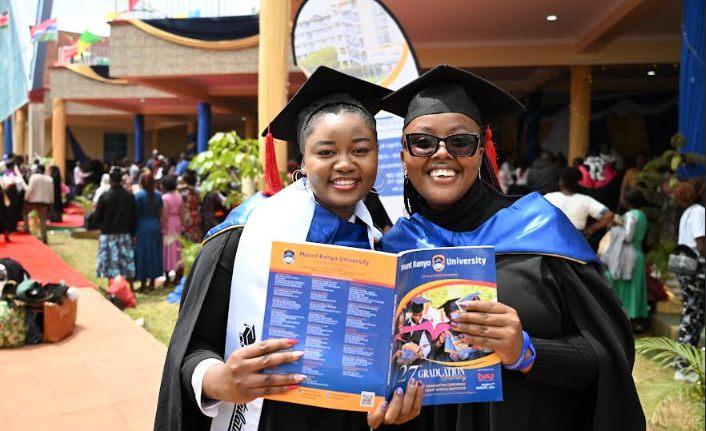
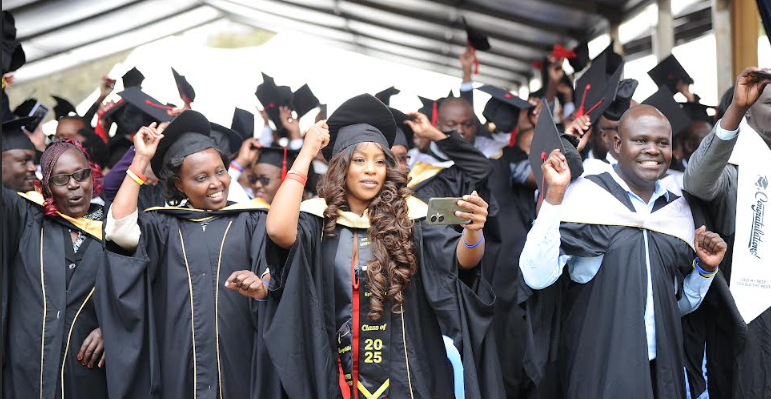
Mount Kenya University has unveiled plans to heavily focus on Artificial Intelligence (AI), unveiling new AI academic programmes and AI-driven approaches to learning.
The university on Friday, August 8, said it would introduce new AI courses, which add to the recently announced new AI-powered ICT system to ease management of education programmes.
The University announced the new courses during its 27th graduation ceremony, themed “Catalysing Innovation: Universities as Drivers of Artificial Intelligence”.
Vice Chancellor Prof. Deogratius Jaganyi said the theme reflects MKU’s renewed strategic direction—one that positions AI as central to teaching and learning.
As part of this transformation, the university has introduced 13 new and revised programmes, including flagship courses such as the Master's and Bachelor of Science in Data Science and Artificial Intelligence.
“Our graduation theme today precisely captures the University's renewed and envisaged strategic direction, rethinking where all university curricula will embrace artificial intelligence attributes, to effectively enhance pedagogy for increased educational outcomes,” said Prof Jaganyi.
“In this regard, MKU has continued to mount new curricula as well as revise and revamp the existing curricula. To this end, the University Council has approved and supported a total of 13 programmes, key among these curricula being Master of Data Science and Artificial Intelligence and Bachelor of Science in Data Science and Artificial Intelligence, both of which will be offered in the School of Computing and Informatics.”
At the graduation ceremony, more than 6,000 graduands were conferred and awarded bachelor's (5,447), master's (691)) and doctoral degrees (10).
Among the graduands were 86 students from the Equip Africa Institute, the Kitale-based MKU affiliate specialising in training healthcare workers.
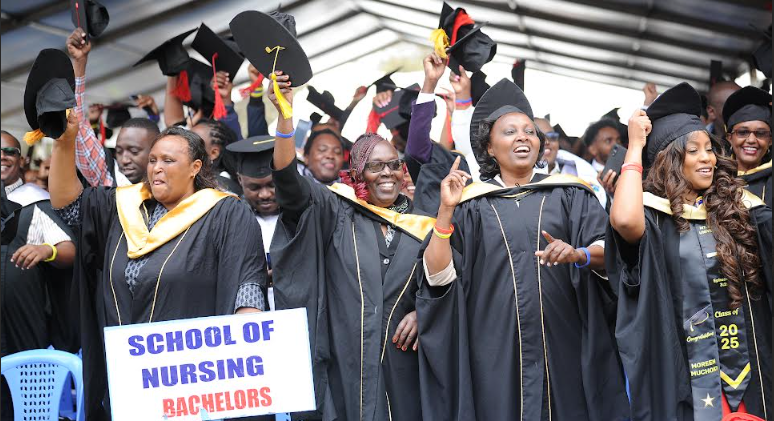
Dr Vincent Giatho said that in line with the University's vision to be a global hub for excellence in education, research, and innovation, AI would be key in enhancing operational efficiency, supporting faculty-led research, driving student innovation, and enabling data-informed decision-making across the institution.
Other than new courses, the university has recently introduced AI-enabled systems in the management of the institution.
“An integration of AI into core systems and processes helps to streamline operations and strengthen service delivery. An AI-integrated ICT system significantly enhances the ability to monitor and manage key academic and administrative functions in real-time,” said Dr Gaitho.
“MKU continues to embrace AI as a strategic enabler in its digital transformation journey. The Council has approved the implementation of a robust ICT system known as University Integrated Resource Platform (UnIRP), a major catalyst in the university’s vision of digital transformation, institutional excellence, and student-centered service delivery.”
“By embracing advancements in technology, the University Council hopes to improve the teaching and learning experience of our students and enhance operational efficiency at the University.”
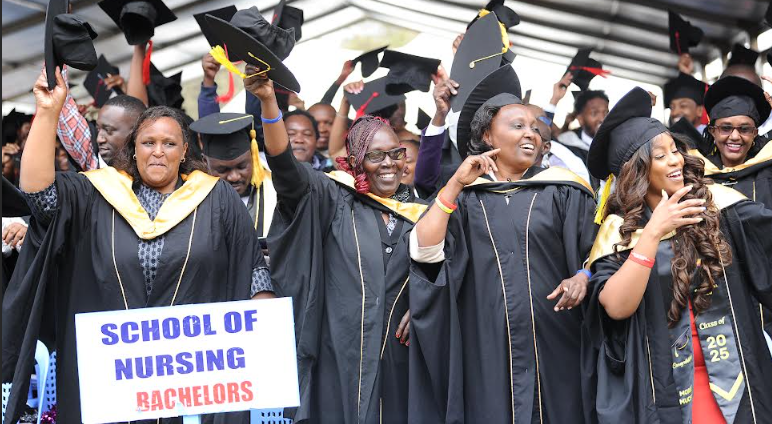
The new ICT system is a custom-built digital environment that is designed to enhance student experience, boost research and enable increased student engagement.
Dr Tonny Omwansa, chief executive officer, Kenya National Innovation Agency (Kenia), also noted the importance of innovation and AI, saying it offered young people limitless opportunities not just now but also in years to come.
“The theme of MKU’s 27th Graduation ceremony recognizes that universities like MKU are not just consumers of trends but are expected to be catalysts of trends that shape socio-economic development, actively shaping innovation and AI-driven discourse in academia and industry,” he said in his keynotespeech at the graduation, further urging the graduands and students still pursuing their studies to make the best of AI, noting they stand to get the best of a new era.
“You stand at the frontier of a new era. With AI, you can not only innovate, but you can transform lives. For inspiration, look at MKU’s past graduates, look at other students from other universities already creating social impact through tech.”
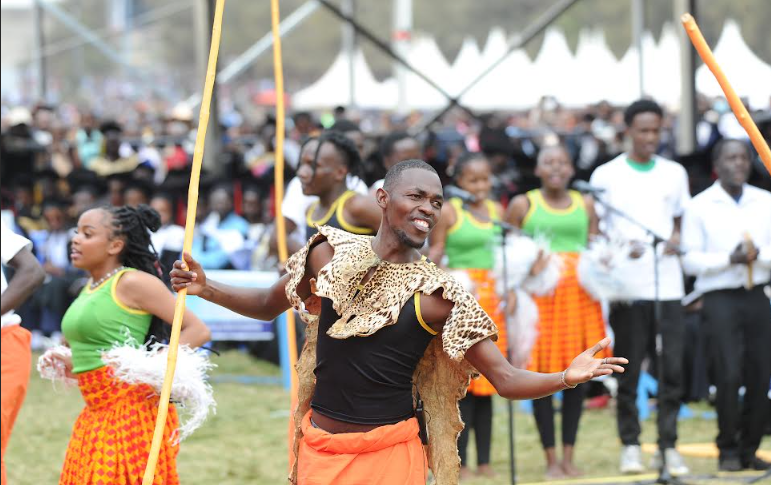 Entertainment during Mount Kenya University’s 27th graduation ceremony which was held at the graduation pavilion in Thika. (Photo: John muchucha)
Entertainment during Mount Kenya University’s 27th graduation ceremony which was held at the graduation pavilion in Thika. (Photo: John muchucha)The university has recently been named the United Nations Academic Impact (UNAI) hub chair on industry, innovation, and infrastructure.
“MKU competitively obtained a new status of United Nations Academic Impact (UNAI) position as the UNAI SDG 9 Hub Chair on Industry, Innovation and Infrastructure for a three-year period that shall end in 2027,” said Prof. John Struthers, Chancellor of MKU.
The new designation comes after MKU was in 2021 named the UNAI Hub for Sustainable Development Goal (SDG) 10 on Reduced Inequalities for a three-year period.
“This position brings together other universities that serve as the Vice-Chairs to this Hub; two of which are LaSalle University of Spain and Japan’s Nagaoka University of Technology,” said Prof Struthers.
“Notably, this position has raised the University’s visibility globally as evidenced by MKU’s physical representation at the Global Higher Education Symposium at the UN Headquarters in New York City in July 2025 in the privileged discussion on Higher Education Institutions’ role in support of Sustainable Development Goals (SDGs).”
Prof Struthers also announced the establishment of the Mount Kenya University Alumni Award with a cash prize of Sh5 million. He said the award seeks to identify individuals who have made remarkable contributions to society post-graduation. The inaugural award will be competitively awarded during the December 2025 graduation.
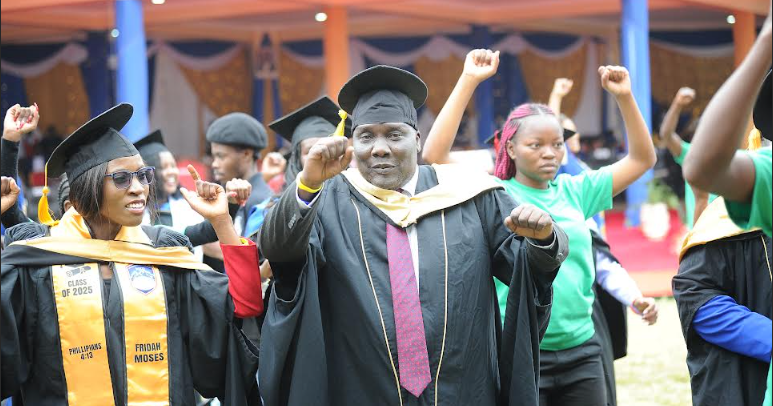
Gikera Kihara, Chairman MKU Alumni Association, acknowledged the role that the university had plumbed in revitalizing the Directorate of Alumni Relations, which now engages the alumni community.
“The MKU Alumni Association is now officially registered, complete with a constitution that structures our engagement with the university and among ourselves,” he said.
“We have organised several reunions and webinars, creating platforms for networking, learning, and collaboration. These events revealed that many alumni possess valuable skills—from event management to entrepreneurship—that the university and alumni association should recognise and leverage.”
Prof Jaganyi said aside from academics, the university continued to nurture other talents by encouraging and facilitating students to participate in extracurricular activities.
“The University has continued to grow the talents of our students’ sports and creative performing arts division. Since the last graduation, students have participated and excelled across different events,” he said.
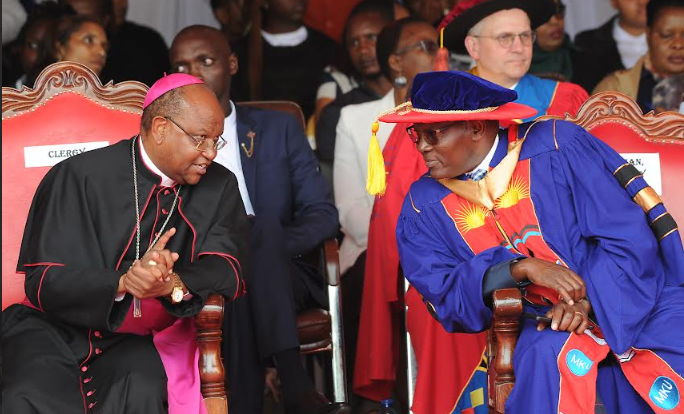
During the East Africa University games that took place in December 2024 at Maseno University, MKU teams emerged the best overall in Badminton, Athletics and Woodball ladies.
At the Kenya National University Championship held in February this year, MKU teams dominated by being crowned champions in: badminton ladies, woodball men and ladies, and table tennis ladies.
MKU was also declared the best University and the most prolific University at the Kenya National Drama Festival, 2025.
“This good performance earned the drama group a ticket to represent the University at the East Africa Music, Dance and Drama Festivals scheduled for later in the month of August 2025 in Uganda,” he said, adding that the university had endeavoured to be an inclusive institution and
continued to support students enabled differently, whose enrolment keeps rising.
“I wish to observe that MKU is committed to continuing to produce well-rounded and grounded graduates prepared to unlock infinite possibilities like the ones we are celebrating today.”
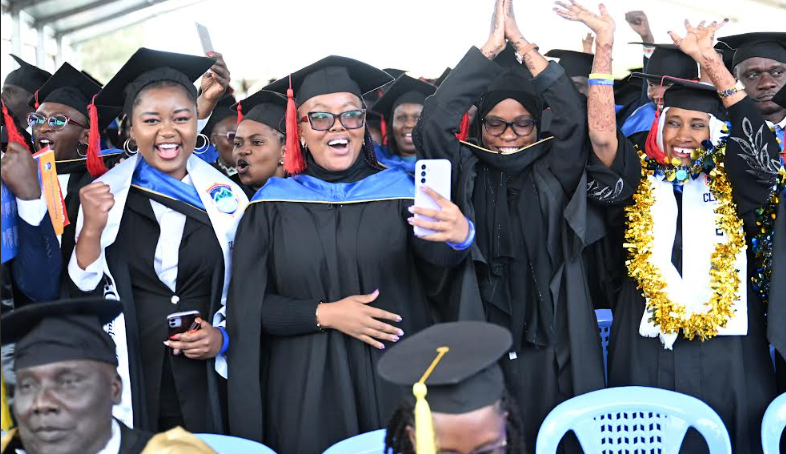
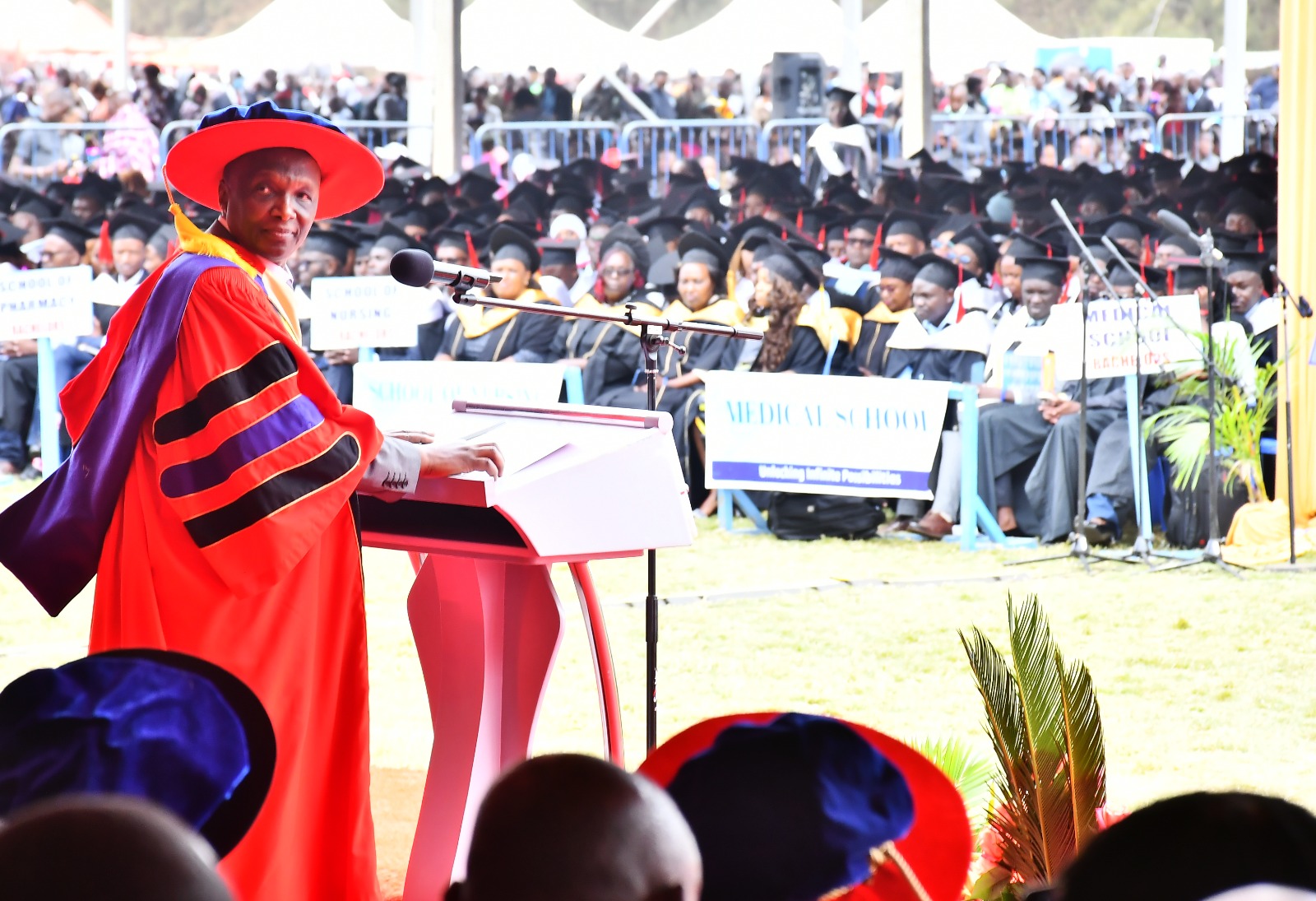
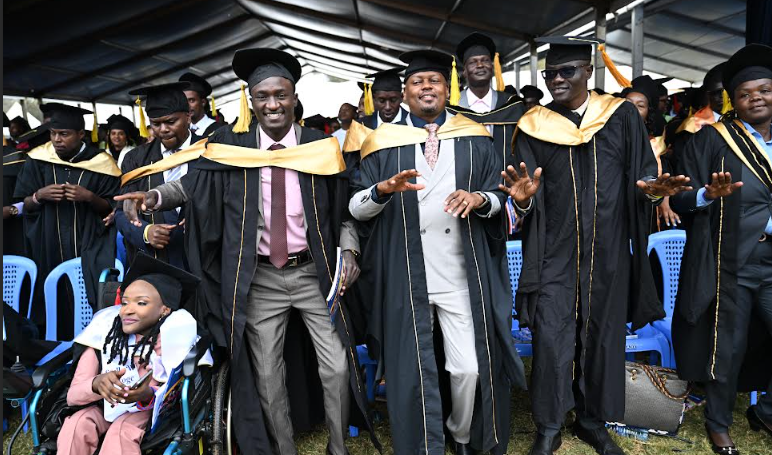
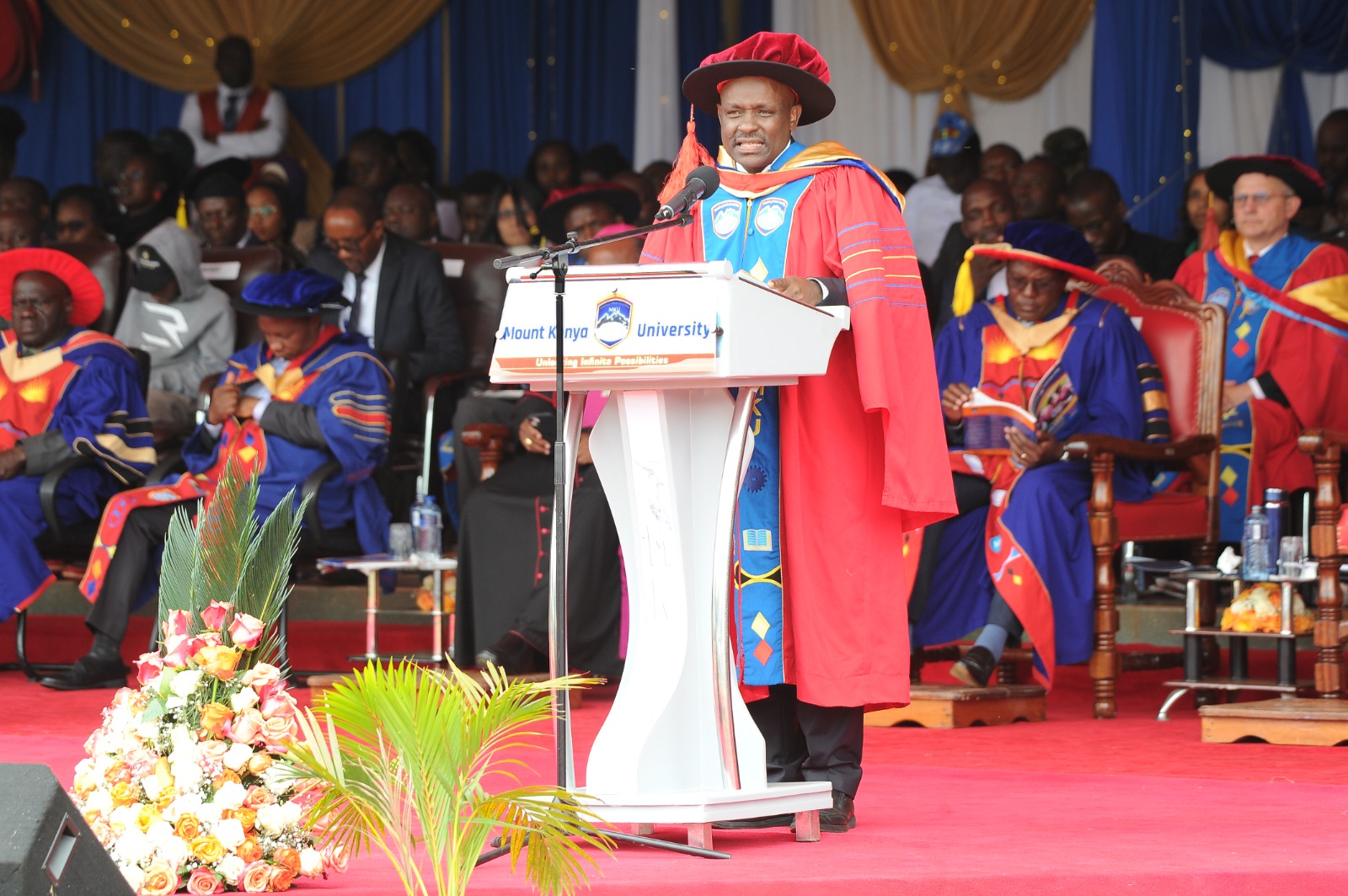
Dr.Tonny Omwansa, CEO, Kenya National Innovation Authority, during MKU’s 27th graduation ceremony, which was held at the graduation pavilion in Thika. (Photo: John muchucha)
